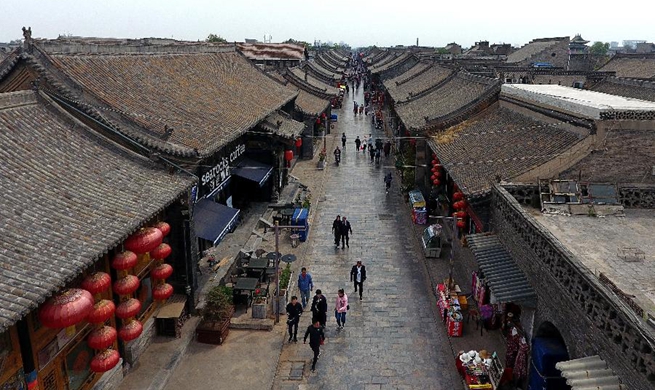CHONGQING, May 7 (Xinhua) -- Police officer Hu Yang, a medium-height and stout figure, looks inconspicuous in the crowd, but he faces some of the most dangerous criminals in the city.
Yu leads a 100-member squad in fighting organized crimes in the Public Security Bureau of Yubei District, Chongqing, a metropolis in southwest China with a population of 31 million.
In 2018, Chongqing launched a special campaign against organized crime and gang members, and Hu only took three days off the whole year. By the end of March, more than 2,500 criminal cases had been investigated as a result of the special campaign. A total of 2,676 criminal suspects have been detained.
"Officer Hu goes all out when he investigates a case, and he hardly rests," said Zhang Yue, a colleague of Hu.
"Organized crimes have become harder to investigate. It takes many field investigations and efforts to pore through voluminous papers to locate the evidence," Hu said.
Having spent 15 years as a police officer, Hu often has to put himself in harm's way to protect others. In 2016, one of the suspects he arrested had a loaded gun. "If I had not seized his hands, he would have probably pulled the trigger and wounded the police officers or the public," Hu said.
Discipline, dedication, and bravery of Chinese police officers like Hu have helped maintain peace, order and public security.
"People long for brightness, but to safeguard that brightness, we need to strike at the dark side," Hu said.
Statistics show that the homicide rate in China, 0.81 in every 100,000 people, was one of the lowest in the world in 2017. More than 95 percent of the people are satisfied with the overall situation of public security.
Aziz Ullah from Afghanistan has lived in Yiwu, known as the world's supermarket, for 15 years. He relies on the Yiwu-Madrid freight train service to send consumer goods from Yiwu to his shop in London.
"The primary feeling of living in China for so many years is that it is safe here. My family and I have never experienced theft or robbery. Disputes in business are handled in a fair and professional manner," said Ullah.
Ullah is among 21 foreign mediators invited by the local government to help mediate trade disputes between Chinese and foreign merchants.
Yiwu has around 15,000 foreign residents from more than 100 countries. It receives more than 400,000 overseas visitors every year.
The city has issued over 10,000 merchants' cards, which contain the electronic information of foreign businessmen in Yiwu. With the cards, foreign merchants can apply for residence permits in Yiwu. In case of an emergency, they can present the card to the police for help.
Not far from Yiwu, Hangzhou, capital of Zhejiang Province, is taking the lead in the nation's drive to build smart cities. It has boosted city-wide use of technologies such as AI and the Internet-of-Things (IoT) to help manage traffic and spot security hazards.
As the host city of China's internet giant Alibaba, Hangzhou has implemented the Alibaba City Brain project using AI algorithms to monitor and control traffic signals and street cameras.
Wang Jian, chairman of the technology committee of Alibaba Group Holding Ltd., said the city brain system, covering 420 sq km of the downtown area, is accessible to urban management, public security and tourism authorities, helping them respond to emergencies and promptly handle urban problems.
With information sensed and automatically alerted by the system, the public security departments can monitor and swiftly dispatch police officers to restore order and tackle traffic congestion.
Hangzhou police said the city brain system has helped double the capacity of police, which is equivalent to adding 280 police officers on a single day.
In Zhejiang, the goal to build a safe province has seen actions to ensure security in political, social, economic, Internet and environmental fields.
In 2018, the number of criminal cases in Zhejiang dropped by 13.1 percent year on year. The number of homicides decreased by 10 percent, said Zhu Chen, deputy secretary of the Zhejiang Provincial Committee of Political and Legal Affairs.
Due to improved police efficiency, fire-related accidents in 2018 decreased by 32.5 percent, and deaths caused by such accidents were down by 37.5 percent year on year.
Yang Guoqing, an official with the Public Security Bureau of Jianggan District of Hangzhou, said technology has helped police improve precision and efficiency.
"Now, in 94 percent of the cases we handle, police officers can arrive at the scene of a crime or accident within five minutes after they receive an alert sent by the system," said Yang.
"The future of police work will be more digitized, networked and rely on information technology. It will help us predict, alert and respond to any situation that needs our assistance," he said.

















